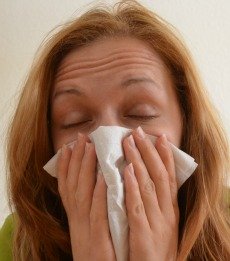Allergy Symptoms Awareness
Allergy symptoms vary depending on whether we are dealing with true allergy, hypersensitivity or food intolerance.
Allergy is a defense reaction of body’s immune system to an
allergen. When our body comes in contact with an allergen, it produces
antibodies, mostly Immunoglobulin E (IgE). Next time the allergen gets into our
body, IgE-affected cells produce chemicals that cause allergic reaction.
If the immune system produces an antibody other than immunoglobulin the condition is called hypersensitivity. Visit food allergies section to read more.
Food intolerance is caused by the body’s failure to break down the food. The failure is caused by the shortage of enzymes.
Lactose intolerance is the most common form of intolerance. Visit intolerance section to read more.
Let your doctor analyze the symptoms and come up with an action plan.
Here is a list of allergy symptoms:
- Rashes
- Hives
- Sneezing
- Runny nose
- Watery eyes
- Swollen eyes
- Eczema
- Swelling
- Coughing
- Wheezing
- Allergic colitis (see below for more information)
- Anaphylactic shock (collapse) (see below for more information)
Here is a list of hypersensitivity symptoms:
- Vomiting
- Gassiness
- Diarrhea
- Colic
- Blood in the stool
- Mucous in the stool
- Excessive spitting up
- Inadequate weight gain
- Abdominal pain
Here is a list of food intolerance symptoms:
- Diarrhea
- Cramping
- Boating
- Nausea
- Abdominal pain after meal
- Diagnosed gastroenteritis
- Blood or mucous in the stool
Some other general symptoms include:
- Fussiness
- Irritability
- Anxiety
- Crying
- Headaches
- Hyperactivity
- Sleeplessness
- Muscle pain
These symptoms appear any time from when the allergen is still in our baby's hands to several hours or days after it is gone.
Evaluate your child’s condition. If his/her lips, tongue, face are swollen, and he/she has trouble breathing or swallowing, call 911.
These are the signs of anaphylactic shock (collapse) - a very severe life-threatening allergic reaction. Symptoms develop very fast and medical assistance should be sought immediately.
Most common symptoms are swollen face and throat, hives, abdominal pain, vomiting, diarrhea, low blood pressure. First aid should be an adrenaline (epinephrine) injection. If your baby had anaphylactic shock, analyze his/her surroundings carefully to single out a potential trigger. Avoid it going forward.
Allergic colitis deserves a special note too. Some food proteins can irritate baby’s gastrointestinal system and cause inflammation. The main symptom of an allergic colitis is blood and mucous in the baby’s stool. This usually starts at the age of two months.
However, I saw blood in my son’s stool when he was 5 months old. It was just a tiny bloody spot and maybe I haven’t noticed it before. My son was healthy and happy otherwise. Nothing seemed to bother him. Read my story here.
There are many other reasons why blood can appear in the
stool. It may be caused by an injury during constipation. It may as well be a
sign of infections or parasites. In any case, call your doctor if you see blood in your baby’s stool. Large amount of blood requires
immediate doctor’s attention.
Allergy symptoms are really difficult to be certain about. In any case keep on breastfeeding. If you quit before 12 months of age, your baby will need to start formula. Most formula brands use intact dairy or soy proteins, which cause allergies.
Watch your baby, look for cues and keep on being a happy breastfeeder!
There are many ways to show your love and devotion to your kids and to win their trust. Breastfeeding is the most natural one.
Yours,
Viktoriya
Back to top of Allergy Symptoms>Food Allergies>Breastfeeding Home











